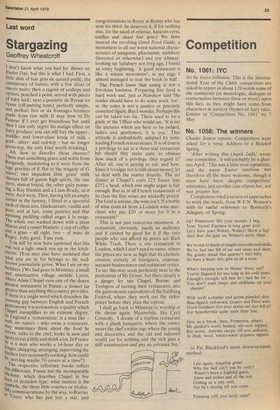Last word
Stargazing
Geoffrey Wheatcroft
I don't know what you had for dinner on Easter Day, but this is what I had. First, a little dish of foie gras de canard poele, the consistency of butter, with a few slices of navets noirs; then a ragout of scallops and oysters, poached a point, served with pieces of baby leek; next a poulette de Bresse en vessie (off-putting term), perfectly simple, and perfect; five or six fromages fermiers Made from raw milk (I may bow to Dr Pasteur if I ever get brucellosis but until then I can only regret his malign effect on dairy produce: you can still buy the upper-. middleand lower-class kinds of milk — gold-, silverand red-top — but no longer green-top, the only kind worth drinking). Ah, 'how to describe those cheeses? There was something grave and noble from Burgundy, modulating as it were from the sage gravitas of E flat to the tragedy of G minor; two impudent little goats' milk Cheeses full of gamin high spirits, the one stern, almost brutal, the other gaily pouncing, a Ray Nankin and a Liam Brady, as it were. As it were. Then, having left an empty Corner in the tummy, I fitted in a spoonful each of three ices, blackcurrant, vanilla and Pear; and at last, some pastries and that amusing pudding called anges a la neige. The whole was washed down with a plain Macon and a russet Manicle; a cup of coffee and a glass — all right, two — of marc de angey. Jolly good. Yum yum. You will by now have surmised that this was not a light snack run up in the kitchenette. (You may also have surmised that what you are in for belongs to the wellknown journalistic genre, What I ate on my holidays.) We had gone to Mionnay, a small and unattractive village outside Lyons, Where Alain Chapel runs one of the dozen greatest restaurants in France; a fortiori far greater than anything this country provides. If there is a single word which describes the Yawning gap between English and French gastronomy it is seriousness: a quality which C,11aPel exemplifies to an extreme degree. n England a 'restaurateur' is a man like — Well, no names — who owns a restaurant, 'flay sometimes think about the food he serves, talks to the chef, looks in now and iagain to eat a little and drink a lot. In France :le is a man who works a 14-hour day or ger, shopping, arranging, supervising the tItchen (not necessarily cooking: how could ge, serving maybe 70 covers at a time?) The respective reference books reflect thrs difference. France has the incomparable lit:hchelin, which describes Chapel in five Ines of proseless type: what matters is the SYmbols, the three little rosettes or etoiles. (MY commiserations, by the way, to Barrier at Tours, who has just lost a star, and congratulations to Boyer at Reims who has won his third: he deserves it, if for nothing else, for the salad of celeriac, haricots verts, truffles and diced foie gras.) We have instead the revolting Good Food Guide, a monument to all our worst national characteristics of smugness, pharisaism, snobbery (inverted or otherwise) and coy whimsy: looking up Salisbury not long ago, I found an entry beginning, 'A good restaurant is like a sonata movement'; in my rage I almost managed to tear the book in half.
The French know that eating is not a frivolous business. Preparing fine food is hard work and, just as Nabokov said 'the reader should have to do some work, too', so the eater is not a passive or precisely cossetted figure. But! wonder. Perhaps this can be taken too far. There used 4o be a guide at the Uffizzi who would say, 'It is not the pictures which are here to be judged, ladies and gentlemen, it is you.' That attitude is undoubtedly adopted by some leading French restaurateurs. It is of course a privilege to eat at a three-star restaurant but should they make quite so obvious how much of a privilege they regard it? After all, one is paying to eat: and 'how. Since it is vulgar not to talk about money, let us deal with the matter directly. The set dinner at Chapel's costs 225 francs (say £25) a head, which one might argue is fair enough. But as in all French restaurants of its class the fine wines are wickedly priced. The food is unique, the wine isn't. If a bottle of wine costs £4 from a London wine merchant why pay £20 or more for it in a restaurant?
This is not just rancorous meanness. A restaurant, obviously, needs an audience and it cannot be good for it if the only people who can afford its prices are Rich White Trash. There is one restaurant in London, which I don't need to name, where the prices are now so high that its clientele consists entirely of foreigners, expenseaccount-businessmen and restaurant critics. To say this may seem perilously near to the puritanism of Mr Driver, but there clearly is a danger for wet Chapel, Bocuse and Troisgros of turning their restaurants into the gastronomic equivalents of the Salzburg Festival, where they work out the ticket prices before they plan the operas.
I shall go back to Mionnay to worship at the shrine again. Meanwhile, like Cyril Connolly, 'I dream of a starless restaurant with a plush, banquette where the owner wears the chef's white cap, where the young and decorative and the old and talented would eat for nothing and the rich pass a stiff examination and pay an entrance fee.'






































 Previous page
Previous page